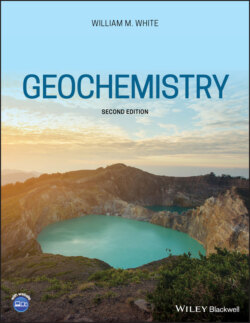Читать книгу Geochemistry - William M. White - Страница 32
2.2.2 Properties of state
ОглавлениеProperties or variables of a system that depend only on the present state of the system, and not on the manner in which that state was achieved, are called variables of state or state functions. Extensive properties depend on total size of the system. Mass, volume, and energy are all extensive properties. Extensive properties are additive, the value for the whole being the sum of values for the parts. Intensive properties are independent of the size of a system, for example temperature, pressure, and viscosity. They are not additive, for example, the temperature of a system is not the sum of the temperature of its parts. In general, an extensive property can be converted to an intensive one by dividing it by some other extensive property. For example, density is the mass per volume and is an intensive property. It is generally more convenient to work with intensive rather than extensive properties. For a single component system not undergoing reaction, specification of three variables (two intensive, one extensive) is generally sufficient to determine the rest, and specification of any two intensive variables is generally sufficient to determine the remaining intensive variables.
A final definition is that of a pure substance. A pure substance is one that cannot be separated into fractions of different properties by the same processes as those considered. For example, in many processes, the compound H2O can be considered a pure substance. However, if electrolysis were involved, this would not be the case.
